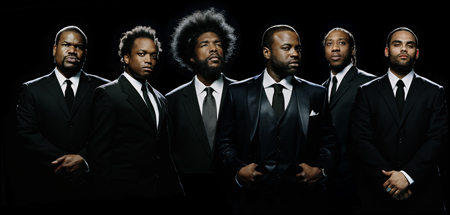
BLEAKNESS: The Roots forgo crossover dreams for ghetto solidarity. |
The wild, idle guessing game over the Roots’ Game Theory (Def Jam) and OutKast’s Idlewild (LaFace/Zomba) is finished. Although OutKast are the biggest, most critically beloved duo in hip-hop, their first new CD in three years got mixed reviews and dropped out of the Top 20 within four weeks, and the Idlewild Hollywood movie, to which the album is the erstwhile soundtrack, fared even worse. Despite massive pre-release publicity, this quasi-musical — starring Andre “3000” Benjamin and Antwon “Big Boi” Patton as musicians in a 1930s nightclub in the fictional town of Idlewild, Georgia — had opening-weekend receipts of around $12 million. That was about the same garnered by End of the Spear, a Christian parable released in January’s doldrums and marketed mostly to Mormons.
Less was expected of the Roots, especially since their expensive 2004 Geffen one-off, The Tipping Point, was a poppish gambit that did less than nothing to break the group out of the bohemian hip-hop underground. Yet the veteran Philadelphia band (with real live instruments!) were personally signed to their new label, Def Jam, by head honcho Jay-Z. It raised hopes that Game Theory might return them to the creative and commercial apex they had reached on their first label, MCA, when consecutive landmarks Things Fall Apart and Phrenology went gold in 1999 and 2002. But though the reviews have been strong, sales have not. In its first three weeks of release, Game Theory plummeted from #9 to #53 on the Billboard 200, 10 spots below the not-so-landmark Kidz Bop Ten, which has been on the chart twice as long.

These commercial shortfalls matter because, as anyone reading this knows, OutKast and the Roots are hip-hop leaders as much as hip-hop artists. Grounded by the somber, introverted flow of Tariq “Black Thought” Trotter, the Roots became a central force in the rebirth of hip-hop’s alternative subculture in the late ’90s, trading alt-rap’s Daisy Age lightness for a grim “realness” that could hold its own against any gangsta brutality. Atlanta’s OutKast went even higher. Although they were originally a part of gangsta’s Southern campaign, they mingled their speedy, druggy boasts with an organic, expansive attitude and musicality reminiscent of prime Prince and George Clinton’s P-Funk heyday, transcending their base without alienating it.
You could say the crews’ latest discs are failures simply because they’re no longer leading anyone. That’s not their audiences’ fault: the Roots’ disc is all about hunch-shouldered withdrawal, and OutKast’s confusing eclecticism attests to a strained relation with the “Ghetto Musick” they once celebrated, not to mention ambivalence about their own career. Yet the more I play these discs, the more I’m convinced this failure is anything but fatal. Both the chilly yet masterful Game Theory and the sketchy yet far-reaching Idlewild reward repeated listenings with satisfying and often moving music that lays out complementary visions of where hip-hop could go, even if these acts aren’t taking their audiences with them.

FLYING?: OutKast’s confusing eclecticism attests to a strained relation with the “Ghetto Musick” they once celebrated and ambivalence about their own career. |
Of course, it’s not clear that Andre 3000 and Big Boi will get there themselves. After the divisions of Speakerboxxx/The Love Below — a double album featuring one all-but-solo disc per rapper — the Idlewild project prevaricates about the group’s future while limning the tension between Andre 3000’s dream of flying and Big Boi’s loyalty to home more explicitly than ever. Whereas the Idlewild movie distills that tension with period-piece fantasy and genre-picture clichés, the album deals with it every which way but loose. Some numbers stick to the script with anachronistic bastardizations of 1930s styles, from blues to jazz to Cab Calloway swing; others provide meta-commentary on the film, the crew’s story, and the wider world with just about every other black style between then and now: R&B, gospel, a marching band, even moments of straight Southern hip-hop. The array is exhausting, but as much as any rapsterpiece you can name, it also proves that generations of black-music history can fit under hip-hop’s low-slung hoodie.Still, like its most salient precedent, Prince’s 1986 album Parade and movie Under the Cherry Moon, the project has faltered critically and flopped commercially because reaching for the past requires the artists to loosen their grip on the present. What’s more, Andre 3000 has finally been stymied by his pessimism, even while Big Boi remains as inspired as ever (if not more so). For all their invention, a sense of futility hangs over most of Andre 3000’s structurally foreshortened solo numbers, as “an angel dies” even when our hero escapes a constricting world, and the promise that “Life Is a Musical” ends in a “Hollywood Divorce.” (“All the fresh styles start out as a good little hood thing . . . but by the time it reaches Hollywood it’s over.”) That number also features Lil’ Wayne, Snoop Dogg, and Big Boi musing over divorce as reality and metaphor, a theme that Big Boi returns to in some of the album’s best cuts: the quick-stepping yet downcast “Peaches,” the crunk/jump blues “Call the Law” (featuring singer Janelle Monae as the jilted wife), and especially the lovely yet wrenching rhythm-and-pop song “The Train,” a recap of the crew’s career that may be the best thing Big Boi has written. These suggest that if Big Boi is staying close to the hood, he’s leaving behind the destructive allure of playing a hood and finding his own fragile peace in the struggle between integration and independence, a struggle that defines not only OutKast’s two-headed persona but hip-hop at the top of the pops, not to mention black America in the post-civil-rights era.